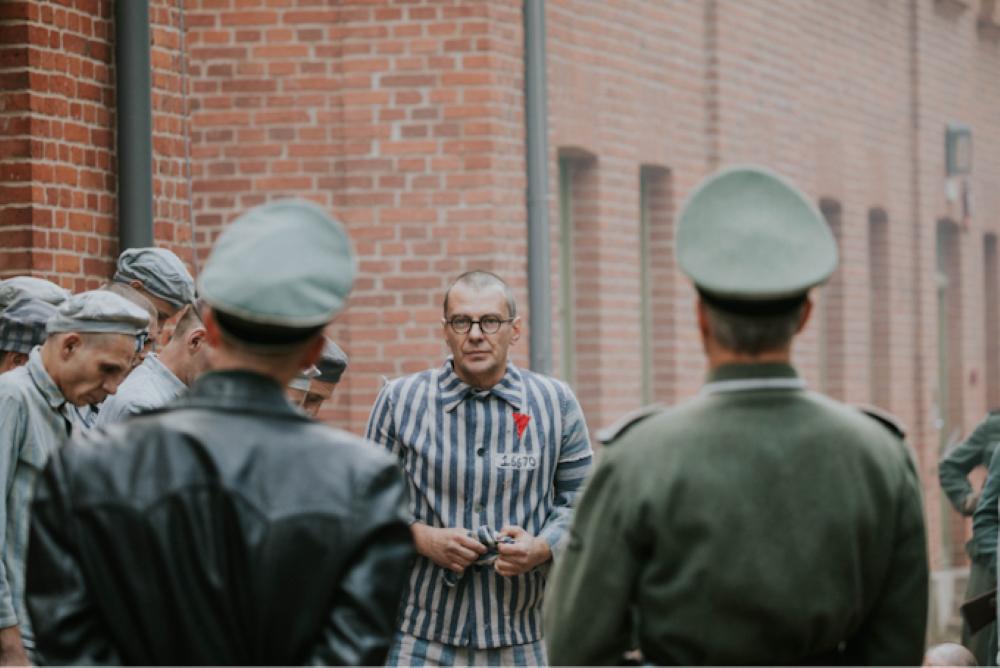
The Polish priest Maximillian Kolbe, portrayed by Marcin Kwasny, enters Auschwitz concentration camp in a scene from the forthcoming film, "Triumph of the Heart." (Michael Sorich)
In October, I traveled to Poland to interview director Anthony D’Ambrosio and the cast of "The Triumph of the Heart," a film chronicling the final weeks of St. Maximillian Kolbe's life in the Auschwitz concentration camp. I shadowed the cast and crew for two weeks, learning about what it takes to independently produce a film and what it means to create art that is both excellent and Christ-focused.
A lot of what I learned while in the small town of Piotrków confirmed what I already suspected: God qualifies the called instead of calling the qualified; if you want to create something that will reach a diverse audience, you have to prioritize diversity in the entire creative process; and of course, praying before filming makes a difference.
But what surprised and delighted me most about this production was the prominent role of women. From the costume designers to assistant directors to scripties to location scouts and the hair and makeup team, this crew was bursting with vibrant young women of faith. And I had the opportunity to sit down with the woman who led them all, "Triumph of the Heart" producer Cecilia Stevenson. This interview has been edited for length and clarity.
NCR: What exactly does a producer do?
Stevenson: Simply put, a producer oversees the making of a film from the script to the screen. Every movie starts as a script — as words on a page. The producer is the one that is responsible for making that script come to life and then getting it in front of an audience. A producer negotiates and makes deals; creates the budget, timelines, and schedules; solves problems; hires and fires; makes decisions; and ultimately collaborates with the rest of their team to make the movie magic happen.
Are there a lot of female producers out there? How about Catholic female producers?
About one-fourth of movie producers are women and I'd guess one-fourth or less of all Catholic producers are women. Speaking only from my experience of producing my first feature film, it has been an all-consuming endeavor.
Advertisement
How does your femininity intersect with your professional and creative work?
The primary ways are in conflict management and environment building. When team members were frustrated, I approached conflict resolution with compassion and empathy. I also can see how my femininity came into play when it came to building the environment of our home and our work spaces in Poland. We had people on our team from different parts of America and Europe and it was part of my job to make sure they were taken care of. I did my best to create warm, welcoming and loving spaces both in our home and on set.
There were a lot of devout Catholic women on set. What are the unique strengths that you think women bring to a film set?
Although we were working under a lot of pressure and the subject matter of our story was heavy and difficult, the women on our team brought a joy and warmth into their work ethic and commitment to the project. That quality created an atmosphere that was very much appreciated by our crew and cast.
Mary plays a prominent role in this family, as does St. Maximilian Kolbe's devotion to her. Can you tell us more about that without spoiling it?
Throughout his life, Kolbe had a beautiful and powerful devotion to the Blessed Virgin and so she is, of course, included in our film. She appears to Kolbe in dreams and visions as his guide throughout our film in beautiful and mysterious ways. We chose to portray Mary as the Immaculata as well as Our Lady of Czestochowa in order to contrast the grief of Poland during this time as well as its purity.







